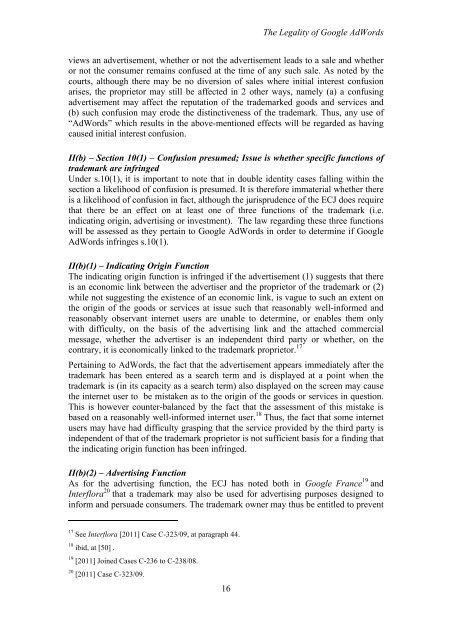Open UKLSR Volume 1(2) - Uklsa
Open UKLSR Volume 1(2) - Uklsa
Open UKLSR Volume 1(2) - Uklsa
Create successful ePaper yourself
Turn your PDF publications into a flip-book with our unique Google optimized e-Paper software.
16<br />
The Legality of Google AdWords<br />
views an advertisement, whether or not the advertisement leads to a sale and whether<br />
or not the consumer remains confused at the time of any such sale. As noted by the<br />
courts, although there may be no diversion of sales where initial interest confusion<br />
arises, the proprietor may still be affected in 2 other ways, namely (a) a confusing<br />
advertisement may affect the reputation of the trademarked goods and services and<br />
(b) such confusion may erode the distinctiveness of the trademark. Thus, any use of<br />
“AdWords” which results in the above-mentioned effects will be regarded as having<br />
caused initial interest confusion.<br />
II(b) – Section 10(1) – Confusion presumed; Issue is whether specific functions of<br />
trademark are infringed<br />
Under s.10(1), it is important to note that in double identity cases falling within the<br />
section a likelihood of confusion is presumed. It is therefore immaterial whether there<br />
is a likelihood of confusion in fact, although the jurisprudence of the ECJ does require<br />
that there be an effect on at least one of three functions of the trademark (i.e.<br />
indicating origin, advertising or investment). The law regarding these three functions<br />
will be assessed as they pertain to Google AdWords in order to determine if Google<br />
AdWords infringes s.10(1).<br />
II(b)(1) – Indicating Origin Function<br />
The indicating origin function is infringed if the advertisement (1) suggests that there<br />
is an economic link between the advertiser and the proprietor of the trademark or (2)<br />
while not suggesting the existence of an economic link, is vague to such an extent on<br />
the origin of the goods or services at issue such that reasonably well-informed and<br />
reasonably observant internet users are unable to determine, or enables them only<br />
with difficulty, on the basis of the advertising link and the attached commercial<br />
message, whether the advertiser is an independent third party or whether, on the<br />
contrary, it is economically linked to the trademark proprietor. 17<br />
Pertaining to AdWords, the fact that the advertisement appears immediately after the<br />
trademark has been entered as a search term and is displayed at a point when the<br />
trademark is (in its capacity as a search term) also displayed on the screen may cause<br />
the internet user to be mistaken as to the origin of the goods or services in question.<br />
This is however counter-balanced by the fact that the assessment of this mistake is<br />
based on a reasonably well-informed internet user. 18 Thus, the fact that some internet<br />
users may have had difficulty grasping that the service provided by the third party is<br />
independent of that of the trademark proprietor is not sufficient basis for a finding that<br />
the indicating origin function has been infringed.<br />
II(b)(2) – Advertising Function<br />
As for the advertising function, the ECJ has noted both in Google France 19 and<br />
Interflora 20 that a trademark may also be used for advertising purposes designed to<br />
inform and persuade consumers. The trademark owner may thus be entitled to prevent<br />
17 See Interflora [2011] Case C-323/09, at paragraph 44.<br />
18 ibid, at [50] .<br />
19 [2011] Joined Cases C-236 to C-238/08.<br />
20 [2011] Case C-323/09.


